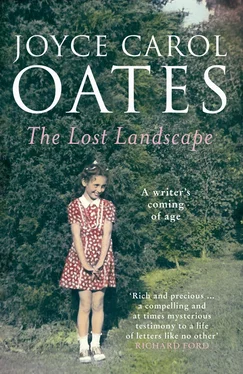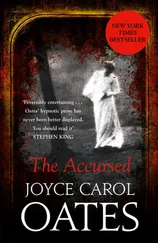1 ...7 8 9 11 12 13 ...17
DISTRICT SCHOOL #7, NIAGARA COUNTY, NEW YORK
I LOVED MY FIRST school! —so I have often said, and possibly this is true.
As a child I was filled with excitement, anticipation, apprehension, sometimes dread at the prospect of school . For the schoolhouse on the Tonawanda Creek Road in Niagara County, about a mile from my home, was a magical place to me, a place of profound significance, and yet it was not a place in which, as a young child, I could exert anything approaching what I would not yet have known to call “control.”
I took for granted then what seems wonderful to me now: that, from first through fifth grades, during the years 1943 to 1948, I attended the same one-room schoolhouse that my mother, Carolina Bush, had attended twenty years before. Apart from the introduction of electricity in the 1940s, and a few minor improvements, not including indoor plumbing, the school had scarcely changed in the intervening years. It was a rough-hewn, weatherworn, uninsulated wood frame building on a crude stone foundation, built around the turn of the century at the approximate time my grandparents’ farmhouse was built, twenty-five miles north of Buffalo and about six miles south of Lockport.
In late August, in anticipation of school beginning after Labor Day in September, I would walk to the schoolhouse carrying my new pencil box and lunch pail, gifts from my grandmother Blanche Morgenstern, to sit on the front, stone step of the school building. Just to sit there dreamy in anticipation of school starting: possibly to enjoy the solitude and quiet, which would not prevail once school started.
(Does anyone remember pencil boxes now? They were of about the size of a small lunch pail, with several drawers that, slid out, revealed freshly sharpened yellow “lead” pencils, Crayola crayons, erasers, compasses. The thrill of a compass with its sharp point! The smell of Crayolas! Lunch pails, which perhaps no one recalls either, were usually made of some lightweight metal, with handles; unlike pencil boxes which smelled wonderfully of crayons and erasers, lunch pails quickly came to smell awfully of milk in Thermos bottles, overripe bananas, peanut butter, jam, or baloney sandwiches, and much-used wax paper.)
The school, more deeply imprinted in my memory than my own child-face, was set approximately thirty feet back from the pebble-strewn unpaved Tonawanda Creek Road; it had three tall, narrow windows in each of its side walls, and very small windows in its front wall; a steeply slanting shingle board roof that often leaked in heavy rain; and a shadowy, smelly, shed-like structure at the front called the “entry”; nothing so romantic as a cupola with a bell to be rung, to summon students inside. (Our teacher Mrs. Dietz, standing Amazon-like in the entry doorway, rang a handbell. This was a sign of her adult authority; the jarring noise of the bell, the thrusting, hacking gesture of her muscled right hand as she vigorously shook it. In my memory, Mrs. Dietz’s sturdy face was usually flushed.)
Behind the school, down a slope of briars and jungle-like vegetation, was the “crick”—the wide, often muddy, fast-moving Tonawanda Creek, where pupils were forbidden to play or explore; on both sides of the school were vacant, overgrown fields; “out back” were crudely built wooden outhouses, the boys’ to the left and the girls’ to the right, with drainage, raw sewage, virulently fetid in warm weather, seeping out into the creek. (Elsewhere, off the creek bank, children, mostly older boys, often swam. They dived from the sides of the bridge when the water was high enough. There was not much consciousness of “polluted” waters in those days and even less fastidiousness on the part of energetic farm boys.)
My memory of the outhouses is a shudder of dread. But lately, I am apt to feel an alarmed sort of sympathy for poor Mrs. Dietz, who had no choice but to use the girls’ outhouse, too.
At the front of the school, and to the sides, was a rough playground of sorts, where we played such improvised games as “May I?”—which involved “baby-” and “giant-steps”—and “Pom-Pom-Pullaway” which was more raucous, and rougher, where one might be dragged across an expanse of cinders, even thrown into the cinders. And there was Hide-and-Seek, and Tag, which were my favorite games, at which I excelled, at least with children not too much older than I was.
Joyce runs like a deer! certain of the older boys, chasing me, as they chased other younger children, to bully and terrorize, would say, admiring.
Inside, the school smelled of varnish, chalk dust, and woodsmoke and ashes from the potbellied stove. On overcast days, not infrequent in western New York in this region south of Lake Ontario and east of Lake Erie, the windows emitted a vague, hazy light, not much reinforced by ceiling lights. We sat in rows of seats, smallest at the front, largest at the rear, attached at their bases by metal runners, like a toboggan; the wood of which these desks were made seemed beautiful to me, smooth and of the red-burnished hue of horse chestnuts. The floor was bare wooden planks. The blackboard stretched across the front of the room. An American flag hung limply at the far left of the blackboard and above the blackboard, running across the front of the room, so positioned to draw our admiring eyes to it, to be instructed, were cardboard squares of the alphabet showing the beautifully shaped script known as Palmer Method.
All of my life, though my handwriting has changed superficially, it is the original Palmer Method that prevails. In an era in which handwriting scarcely exists, and most signatures are unintelligible, those of us who came of age under the tutelage of the Palmer Method can be relied upon to write not just beautifully, but legibly.
Perhaps Palmer Method carried with it an (unwitting, unconscious) moral bias? If beauty and clarity and a wish to communicate are your intention in writing, are you not likely to be good?
Mrs. Dietz, of course, had mastered the art of such penmanship. She wrote our vocabulary and spelling lists on the blackboard, and we learned to imitate her. We learned to “diagram” sentences with the solemn precision of scientists articulating equations. We learned to read by reading out loud, and we learned to spell by spelling out loud. We memorized, and we recited. Our textbooks were rarely new, but belonged to the school district and were passed on, year after year until they wore out entirely. (How I would love to examine those textbooks, now! I have not the vaguest memory of what we were actually being made to read, and what our arithmetic books were like.) Our school “library” was a shelf or two of books including a Webster’s dictionary, which fascinated me: a book comprised of words! A treasure of secrets this seemed to me, available to anyone who cared to look into it.
Some of my earliest reading experiences, in fact, were in this dictionary. We had no dictionary at home until, as the winner of a spelling bee sponsored by the Buffalo Evening News , when I was in fifth grade, I was given a dictionary like the one at school. This, like the prized Alice books, remained with me for decades.
My early “creative” experiences evolved not from printed books but from coloring books, predating my ability to read. I did not learn to read until I was in first grade and six years old, though by this time, comically precocious as I seem now in retrospect, I’d already produced a number of “books” of a kind in tablet form, by drawing, coloring, and scribbling in what I believed to be a convincing imitation of adults. My earliest fictional characters were not human beings but zestfully if crudely drawn upright chickens and cats engaged in what appeared to be dramatic confrontations; of course, Happy Chicken figured predominantly. The title of one of these tablet-novels was allegedly The Cat House , which was set in an actual house in which cats lived as human beings might live. (When I was an adult my father would joke with me about this title, whose double entendre humor had escaped me. For years my mother saved the tablet-novel among her things, but I think The Cat House must be lost to posterity by now.)
Читать дальше












